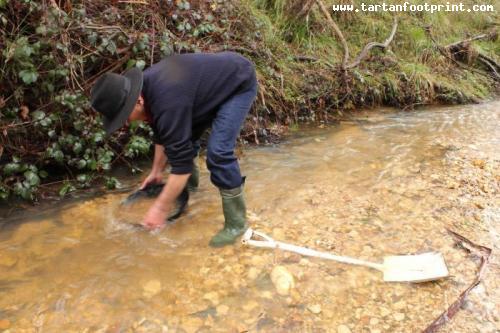You seem to be using an older version of Internet Explorer. This site requires Internet Explorer 8 or higher. Update your browser here today to fully enjoy all the marvels of this site.
May 7, 2018 by Alexander Meldrum
Gold Prospecting, Panning and Mining in Scotland, UK
Gold has been mined commercially in Wales (see Welsh gold) and Scotland. In the UK, gold prospecting can only take place with the explicit perm...Gold Prospecting, Panning and Mining in Scotland, UK
Gold has been mined commercially in Wales (see Welsh gold) and Scotland. In the UK, gold prospecting can only take place with the explicit permission of the riparian owner,
and any activities that cause or permit pollution of a watercourse, even re-suspended silt, could result in a criminal prosecution by the Environment Agency. There are locations where gold panning is a popular activity.
The very idea of gold prospecting in Scotland of all places might seem strange to some, but Scotland, like all countries in the world, has an unknown reserve of gold perhaps buried deep within its mountains.
Panning for gold has been a popular pastime in parts of Scotland for centuries, ever since the first gold was discovered in her burns and streams.
Where to Find Gold In Scotland
Kildonan Burn, Helmsdale, Scotland - Helmsdale, Sutherland, UK get directions
B markerWanlockhead, Scotland - Wanlockhead, Biggar, Lanarkshire ML12, UK get directions
C markerLeadhills, Lanarkshire - Leadhills, Biggar, Lanarkshire ML12, UK get directions
D markerCononish, Tyndrum - Cononish, Tyndrum, Stirling, UK get directions
Permissions for Gold Prospecting
You do need to apply for permission before you pan for gold in Scotland, and that application should be directed to the person who owns the land.
The person who owns the surrounding arable land might not be the owner of the river bank where you plan to pan for gold, so it is worthwhile visiting the local council to see if they can help you in this department.
If you go on an official gold-panning tour with a local specialising company, they will have applied for the correct permissions before hand so you will not then need to do this.
It is also advisable to contact the local Environment Agency, in case they have any legislation in place that stops gold prospectors or others from digging into the river bed or bank.
They should be able to tell you what you can and cannot do.
I bet you didn't even know that there was gold in Scotland.
Scotland is famous for its whisky (liquid gold to some) and golf courses. Gold is there too, not in great quantities although over the centuries there have been mini-gold rushes where gold prospectors have descended in numbers.
The Scottish Crown Jewels, better known the Honours of Scotland, are housed in Edinburgh Castle and are made from Scottish gold which has a market value 5 times higher than other golds, due to its rarity.
There is known to be gold in Kildonan Burn, Helmsdale, Sutherland. This was the focus of a gold rush in the mid 18th century when many people went gold prospecting.
There has been gold found at Wanlockhead and the surrounding Lowther Hills, and Leadhills in Lanarkshire.
A new gold mine has just opened at Cononish in Tyndrum, Perthshire where Australian company Scotgold expect to mine in the region of 20,000 ounces of gold annually, which at today's prices is worth approximately $22 million.
Gold Prospecting Tools
You are going to need prospecting tools in your hunt for gold. The commonest form is the pan for gold panning. You place your pan underwater in a stream, and lift as much of the riverbed silt as you can into the pan.
When you take it out of the water, the water drains off and you can search through the grains left behind for gold.
Other gold prospecting tools include a suction pump for removing the silt from the river bed to your pan, a metal detector, a testing kit to see if you have found gold or iron pyrite - fool's gold.
Welly boots are a must, water-protective, warm gloves may be useful to stop your hands wrinkling up and dropping off through being continually in cold water, and old but warm clothes.
Be prepared for inclement weather if you ever go gold prospecting in Scotland.
How to Pan for Gold
Gold is carried along by streams and rivers, from fissures or cracks in the rocks they've been buried inside since the world was formed 5+ billion years ago.
Being heavy, they sink to the bottom, so the gold prospector has to dig deep into the river bed to find any.
Grains of gold are more commonly found in bends in the river where they tend to get caught up in the silt at the riverbank.
The prospector wants to re-create the river in spate to loosen the gold particles their watery bed,
and so it is not uncommon to see gold prospectors build mini-dams in the river to make the water they are searching a little deeper,
and also to help stop any grains of gold they free from where it was stuck from drifting away downstream unseen.
Gold prospectors fill their pans with silt, then wash off the free-flowing particles of silt and gravel by continually plunging the pan under the surface of the water. Gold is heavy. It does not wash away using this method.
After much back-breaking work, standing knee deep in freezing cold water, while probably being attacked by the midgies that plague any Scottish summer, you may be rewarded with flecks of yellow gold at the bottom of your pan.
Gold prospecting is unlikely to make you rich, but it can grip you with a 'what if' fever that will find you continually returning again and again in the hope of finding your very own El Dorado.
GOOD LUCK
In this photo:


